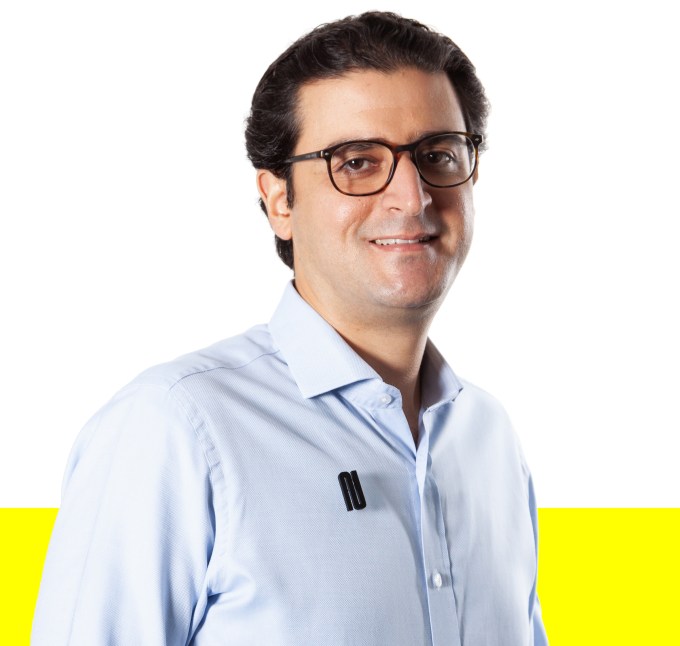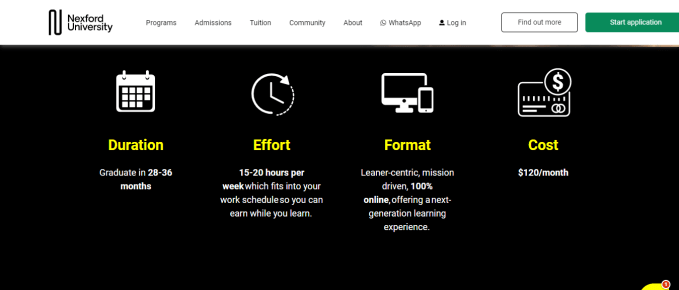Two profound problems face the higher education sector globally — affordability and relevance. Whether you live in Africa, Europe, or the U.S., a major reason why people don’t go to university or college or even drop out because they cannot afford tuition fees. On the other hand, relevance shows the huge gap between what traditional universities teach and what global employers actually look for. It’s not a secret that universities focus a bit too much on theory.
Over the past few years, there has been the emergence of a number of alternative credential providers trying to provide students with the necessary skills to earn and make a living. Nexford University is one of such platforms, and today, it has a closed $10.8 million pre-Series A funding round.
Dubai-based VC Global Ventures led the new round. Other investors include Future Africa’s new thematic fund (focused on education), angel investors, and family offices. Unnamed VCs from 10 countries, including the U.S., U.K., France, Dubai, Switzerland, Qatar, Nigeria, Egypt and Saudi Arabia, also took part.
To date, Nexford has raised $15.3 million, following the first tranche of $4.5 million in seed funding raised two years ago.
Fadl Al Tarzi launched Nexford University in 2019. The tech-enabled university is filling affordability and relevance gaps by providing access to quality and affordable education.
“That way, you get the best of both worlds,” CEO Al Tarzi said to TechCrunch. “You get practical skills that you can put to work immediately or for your future career while actively keeping a job. So the whole experience is designed as a learning as a service model.”
Nexford Unversity lets students study at their own pace. Once they apply and get admitted into either a degree program or a course program, they choose how fast or slow they want the program to be.

Fadl Al Tarzi (CEO, Nexford University)
The CEO says whatever students learn on the platform is directly applicable to their jobs. Currently, Nexford offers undergraduate degrees in business administration; 360° marketing; AI & automation; building a tech startup; business analytics; business in emerging markets; digital transformation; e-commerce; and product management. Its graduate degrees are business administration, advanced AI, e-commerce, hyperconnectivity, sustainability, and world business.
Nexford’s tuition structure is very different from traditional universities because it’s modelled monthly. Its accredited degrees cost between $3,000 to $4,000 paid in monthly instalments. In Nigeria, for instance, an MBA costs about $160 a month, while a bachelor degree costs $80 a month. But the catch for the monthly instalment structure means the faster a learner graduates, the less they pay.
What’s it like learning with Nexford University?
Nexford University doesn’t offer standardized and theoretical tests or assignments as most traditional universities do. Al Tarzi says the company employs what he calls a competency-based education model where students prove mastery by working on practical projects.
For instance, a student working on an accounting course will most likely need to create a P&L statement, analyze balance sheets and identify where the error is to correct it. The platform then gives the student different scenarios showing companies with different revenues and expense levels. The task? To analyse and extract certain ratios to help make sense of which company is profitable and the other unit economics involved.
Though Nexford plays in the edtech space, Al Tarzi doesn’t think the company is an edtech company. As a licensed and accredited online university, Nexford has a huge amount of automation across the organization and provides students with support from faculty and career advisors.
After offering degrees, Nexford puts on its placement hats by fixing its graduates with partner employers.
There’s a big shortage of jobs in Nigeria, and despite the high unemployment, it’s actually difficult to find extremely qualified entry-level graduates. So Nexford has carried out several partnerships where employers sponsor their employees or soon-to-be employees for upskilling and rescaling purposes.
An illustration is with Sterling Bank, a local bank in the country. Most Nigerian banks have yearly routines where they hire graduates and put them on weeks-long training programs. Sterling Bank employs any candidate it feels did great after the capital intensive (eight weeks in most cases) programs.
So what Nexford has done is to partner with Sterling to fund the tuition for high school leavers. When these students go through Nexford’s programs for the first year, they begin to get part-time placements at Sterling. Upon graduation, they get a job in the bank.
“That saves Sterling the training cost and our tuition fee is almost equal to the training that they provided for students. Also, students start paying back once they get placed, so it’s a win-win.”

Nexford University has learners from 70 countries, with Nigeria its biggest market yet. Nexford also has blue-chip partnerships with Microsoft, LinkedIn Learning, and IBM to provide access to tools, courses and programmes to improve the learning experience.
One of the major gains of this learning experience is how it prepares people for remote jobs. Nexford is bullish on its virtual skills grid, where people will get jobs remotely regardless of their location on the platform.
“Across Sub Saharan Africa by the year 2026, there’s gonna be a shortage of about 100 million university seats as a result of huge growth in youth population not met by growth and supply. Even if you want to build universities fast, you wouldn’t be able to meet the demand. And that spirals down to the job market. We don’t think the local economy will produce enough jobs in Nigeria, for instance. But we want to enable people to get remote jobs across the world and not necessarily have to migrate.”
Last year, Nexford’s revenues grew by 300%. This year, the company hopes to triple the size of its enrollment from last year, the CEO said.
Nexford is big on designing students’ curriculum based on analysis of what their employer needs. Al Tarzi tells me that the company always follow the Big Data approach, asking themselves, “how do we find out what employers worldwide are looking for and keep our curriculum alive and relevant?”
“We develop proprietary technology that enables us to analyze job vacancies as well as several other data sources; use AI to understand how those data sets and build a curriculum based on those findings. So, in short, we start with the end in mind,” he answers.
The company is keen on improving its technology regardless. It wants to analyse skills more accurately and automate more functions to enhance user experience. That’s what the funding will be used for in addition to fuelling its regional expansion plans (particularly in Asia) and investing in growth and product development. Per the latter, the online university says it will be launching partner programs with more employers globally to facilitate both placement and upskilling and rescaling.
Merging both worlds of tech and the traditional university model is no easy feat. The former is about efficiency, user-centricity, product, among others. The latter embodies rigidity and continues to lag behind fast-paced innovation. And while there’s been a boom in edtech, most startups try to circumvent the industry’s bureaucracy by launching an app or a MOOC. Nexford’s model of running a degree-granting, licensed, accredited, and regulated university is more challenging but in it lies so much opportunity.
Iyin Aboyeji, Future Africa general partner CEO, understands this. It’s one reason why the company is the first investment out of Future Africa’s soon-to-be-launched fund focused on the future of learning and why he believes the company is a game-changer for higher education in Africa.
“During the pandemic, while many universities in Nigeria were shut down due to labour disputes, Nexford was already delivering an innovative and affordable new model of online higher education designed for a skills-based economy.”
For general partner at Global Ventures Noor Sweid, Nexford University is redressing the mismatch between the supply of talent and the demands of today’s digital economy. “We are thrilled to partner with Fadl and the Nexford team on their journey toward expanding access to universal quality higher education in emerging markets,” she said.

No comments: